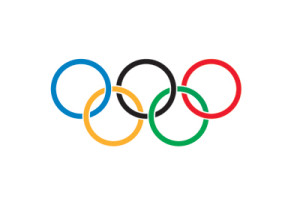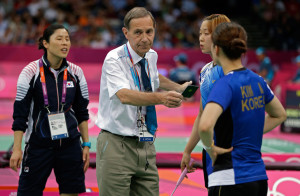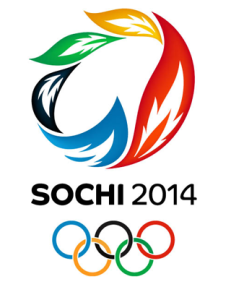
These rings haven’t always been connected by ethics during the Olympic Games.
When the world’s best athletes convene every four years to celebrate the majesty and pageantry that is the Olympic Games, organizers hope that the world focuses on the spotlight of sport, not the shadow of scandal.
Unfortunately, despite the best intentions of Olympics’ officials and organizers, breaches in sports ethics ranging from players cheating to insider gambling manage to worm their way into seemingly every Olympiad. This causes scandal and misconduct to grab more of the limelight than it should.
Take a look at some of the most famous and unfortunate ethical missteps from past Olympic Games both Winter and Summer through the years.
4 Famous Ethics Violations in Past Olympic Games
1988 Summer Olympics – Seoul, South Korea – Men’s 100 Meters
Already the premier glamor event of the track and field competition, the 100 meter final at the 1988 games dialed up the intrigue even more with defending Olympic champion Carl Lewis lining up against emerging world record holder, Ben Johnson.
Johnson blazed out of the blocks and zoomed to the finish line first, setting a new world record time of 9.79, only to see his gold medal and world record stripped from him day later after a positive test for stanozolol, a banned substance. This incident grabbed headlines at the games and spurred much dialogue and action in the modern effort to thwart steroid use among athletes.
2002 Winter Olympics – Salt Lake City, Utah – Figure Skating
Canada’s figure skating duo of Jamie Sale and David Pelletier put on a dazzling display in the free skate program, only to have Russia’s Elena Berezhnaya and Anton Sikharulidze skate away with the gold medal, despite an inferior performance.
Immediately the judges came under scrutiny for questionable marks, especially French judge Marie-Reine Le Gougne. She admitted to falling prey to undue pressure from the head of the French delegation to give higher marks to the Russian skaters, regardless of how well anyone skated. Eventually, to correct this flagrant breach of sports ethics, the International Olympic Committee decided to award a gold medal to the Canadian skaters in addition to the gold medal that the Russian skaters were allowed to keep.
2008 Summer Olympics – Beijing, China – Sailing
In 2008 Irish sailor Peter O’Leary placed a bet on two of his chief competitors, British sailors Iain Percy and Andrew Simpson, to win the gold medal in a sailing event, despite the fact that he was also vying for the gold.
O’Leary won $4,700 when the British pair ended up winning the gold, but faced no disciplinary action from the International Olympic Committe because no definite indication of deliberate losing could be found.
2012 Summer Olympics – London, England – Badminton

In one of the more interesting cases of ethics, eight different women’s badminton players were expelled from the Olympic Games amid accusations of attempting to throw their matches during the 2012 Olympics.
The different players in question, including Chinese superstars Wang Xiaoli and Yu Yang, all gave less than their best efforts in an attempt to better their positions in the medal round and face more favorable opponents. The International Olympic Committee, charging that giving less than their best violated the spirit of the Olympic Games, immediately dismissed players from China, Indonesia and South Korea for their involvement.
Preventative Measures
Because of the prevalence of these types of scandals, the Olympic authorities needed to take action. In the effort to promote ethical behavior on the part of athletes, coaches and games organizers, the International Olympic Committee founded The Ethics Commission in 1999. This 9-member panel is tasked with promoting ethical practices in all Olympic matters.
According to The Olympic Movement’s website, the Commission’s mission is three-pronged:
- Define the ethical principles that govern the Olympic Movement
- Investigate any possible breaches in ethical conduct
- Prevent unethical practices by giving counsel and advice to the International Olympic Committee.
A primary focus of the Ethics Commission is regarding betting. Realizing the destructive nature of betting that violates the integrity of a sport, the commission has outlawed betting in any capacity by Olympics athletes, whether the wagering is on an athlete’s particular sport or not.
In addition, the Ethics Commission forbids the offering of any kind of insider information, a practice that often nefariously pairs with the world of professional wagering. To keep the Olympic Games as a celebrated sporting event free from breaches of ethics, the commission strives to educate athletes as well as strictly monitor the flow of information regarding the games that happens between athletes, coaches and organizers.
An Uphill Battle At These Olympic Games

While the efforts of the Ethics Commission to thwart injustice and promote fair play are inspiring, the nature of competitive sport and the the human condition ensures that future Olympic Games will still struggle with questions of ethics. The will to win often causes athletes and coaches to pursue any possible means of victory, no matter the path to the medal stand.
In this world of ethical land mines, one thing is sure: Olympic authorities will need to continue to be vigilant in Russia and beyond to fight to keep the Olympic Games what they were originally intended to be: a celebration of the human spirit that yearns to go “faster, higher and stronger.”


부산에서 제대로 놀고 싶다면? 서면호빠로 문의 주세요~
수원에 놀러 오셨으면 수원가라오케오셔서 목좀 풀다 가세요
인천 고수익 알바는? 남동구 노래방알바가 책임집니다.
강릉에 오셨으면 강릉호빠가 필수 코스인건 아시죠?
제주도 밤바다 구경 끝나셨나요? 그럼 이젠 제주 홀덤으로 오세요.
꽁머니 전문 커뮤니티 ❤️꽁데이❤️ 신규가입 ✨꽁머니 3만✨ 즉시지급
꽁머니. 꽁포인트, 다양한 꽁머니 이벤트 진행 🔥 꽁머니 받으러 가기 🔥
비니니스 성공의 비결? 접대는 바로!! 수원 셔츠룸에서 이어 나가세요~
보너스 받는 기분으로 팁 많이 받아가세요~ 연수구 룸알바에서 팁 알려 드립니다
비교는 무조건 해 보시길 바랍니다. 저희 부천 룸싸롱이 월등한 것을 아시게 될겁니다.
아무것도 모른다고 속이는 가게들과 다릅니다. 김포 룸싸롱에서 즐겁게 놀다 가세요.
오산쪽에 저희만큼 직원 많이 있는 곳 없습니다. 오산 룸싸롱으로 오셔서 최고의 서비스를 만끽하세요.
동구의 새로운 명소로 떠오르는 대전 동구 노래방알바, 지금 확인해보세요.
당신만 알고 싶은 핫플레이스, 바로 중랑구호빠입니다.
충남 노래방알바에서 특별한 시간을 보내보세요. 충남에서도 소문난 곳이죠.
오늘 하루의 피로를 풀고 싶다면 경기도 노래방알바가 제격이에요.
고양시 룸알바은(는) 감각적인 분위기와 친절한 서비스로 유명해요.
편안한 분위기에서 힐링할 수 있는 곳, 경주호빠입니다.
이 지역에서 진짜 잘나가는 곳을 찾는다면 천안시 룸알바를 주목하세요.
한 번 가보면 왜 인기 있는지 알게 되는 강북호빠.
입소문만으로도 손님이 몰리는 거제시 노래방알바, 직접 느껴보세요.
지인들에게 추천하고 싶은 단 하나의 장소, 바로 구리시 룸알바예요.
경북 경북에서 지금 가장 뜨거운 곳은 단연 경북 룸알바입니다.
일상에 지친 당신을 위한 공간, 구디호빠에서 만나보세요.
숨겨진 핫플레이스 동해호빠, 지금 알아두세요!
화성호빠의 차별화된 분위기를 직접 경험해보세요.
당신의 하루를 바꿔줄 장소, 통영호빠에서 기다리고 있어요.
지금 가장 주목받는 호빠 장소는 바로 목포호빠입니다.
안동호빠은(는) 언제 가도 후회 없는 선택입니다.
오늘 하루의 피로를 풀고 싶다면 원주시 노래방알바가 제격이에요.
당신만 알고 싶은 핫플레이스, 바로 고양시 노래방알바입니다.
이 지역에서 진짜 잘나가는 곳을 찾는다면 하남시 노래방알바를 주목하세요.
편안한 분위기에서 힐링할 수 있는 곳, 구리시 노래방알바입니다.
지인들에게 추천하고 싶은 단 하나의 장소, 바로 남양주시 노래방알바예요.
초보도 환영하는 곳, 이천시 노래방알바에서 새롭게 시작해보세요.
일상에 지친 당신을 위한 공간, 김해시 노래방알바에서 만나보세요.
숨겨진 핫플레이스 안동시 노래방알바, 지금 알아두세요!
당신의 하루를 바꿔줄 장소, 광산구 노래방알바에서 기다리고 있어요.
오늘 하루의 피로를 풀고 싶다면 서면 노래방알바가 제격이에요.
철원군 룸싸롱는 벌써 많은 분들이 다녀간 인기 명소입니다.
용인시 노래방알바에서 특별한 시간을 보내보세요. 용인시에서도 소문난 곳이죠.
당신만 알고 싶은 핫플레이스, 바로 마포구 노래방알바입니다.
지인들에게 추천하고 싶은 단 하나의 장소, 바로 미추홀구 노래방알바예요.
실력 있는 분들이 모이는 곳, 바로 춘천호빠예요.
한 번 가보면 왜 인기 있는지 알게 되는 시흥시 노래방알바.